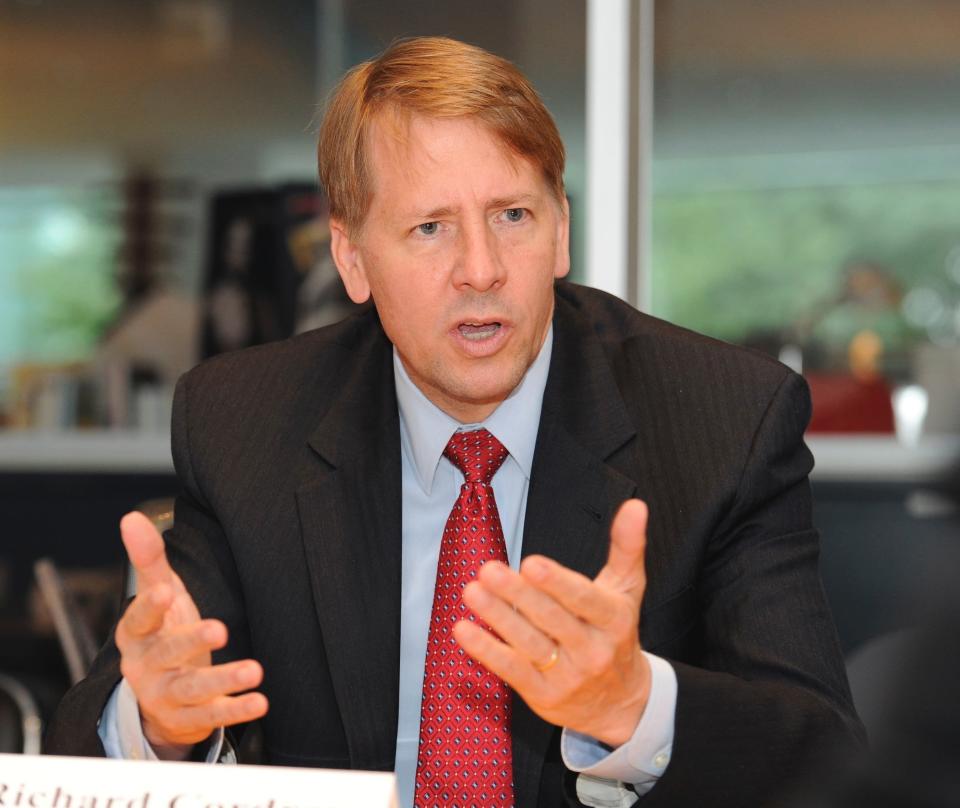Top Education Department official steps down amid crisis over college financial aid
The top Biden administration official overseeing federal college financial aid will depart his role this summer, the Education Department said Friday, capping off a year of turmoil for students and universities.
Richard Cordray, the chief operating officer for Federal Student Aid, will step down at the end of June, officials said. The former head of the Consumer Financial Protection Bureau, Cordray faced mounting criticism from congressional Republicans to leave his post amid calamitous delays in the college financial aid process.
In a statement to USA TODAY, Cordray did not comment on the FAFSA problems. He said his office has achieved key milestones in his three-year term. He has agreed to stay on during an interim transition period.
"Over my tenure, we provided student loan forgiveness to more than 4,000,000 borrowers and their families; made it easier for people to apply for and manage federal student aid; and took strong actions to hold schools accountable for defrauding students," Cordray said.
Cordray's departure comes as scores of high school seniors across the country await aid offers they typically would have received by now. Repeated glitches and errors in the rollout of the new Free Application for Federal Student Aid, or FAFSA, truncated the decision-making timelines for hundreds of thousands of students. College officials have scrambled to get aid offers out the door, sometimes using inaccurate information to make crucial calculations about how much families should expect to pay for college in the fall.
"This is the worst time for a change in management and leadership to happen," said Brittani Williams, a former financial aid counselor and outreach coordinator for Louisiana. Williams, who oversees advocacy, policy and research for the organization Generation Hope, said the change could exacerbate the turmoil and students' distrust in the financial aid system. "This crisis will turn away students from matriculating."

The FAFSA blunders haven’t let up. Now the Education Department has a credibility issue.
At a congressional hearing this month, a panel of experts said the problem with the FAFSA had reached crisis levels and could trigger a drop in college enrollment.
“If there was a financial aid director, or even a college president, that delayed financial aid on their campus for up to six months, the professional price that would be paid for that would be pretty steep,” Justin Draeger, president of the National Association of Student Financial Aid Administrators, said during the hearing.
Congress mandated that the form be simplified, a bipartisan effort that Republicans and Democrats agreed was long overdue. But the Education Department's implementation of the new FAFSA this year was beset with problems, eroding trust between the federal government, higher education institutions, students and their families.
Cordray was at the forefront. His most recent publicly available performance contract indicated that his top priority on the job was implementing the new FAFSA. Republicans, and some former Education Department officials, say he lost sight of that goal and focused too much on student loan relief efforts instead.
Officials in jobs like Cordray's are appointed to fixed terms, and his tenure was slated to come to an end soon if it wasn't renewed. Arthur Wayne Johnson, who served in the gig during the Trump administration and is now running for Congress, said he was glad to see a change at the top, given the recent turmoil.
"They’ve got a serious leadership question now," he said.
Michelle Dimino, director of education at the moderate think tank Third Way, noted the scrutiny the Education Department has faced from Congress. "Congress has made no secret of the fact that they are furious, and the Department also needs Congress to fund them adequately," she said. "A major personnel change like this can be a natural step to reset that dynamic."
Clare McCann, the higher education director at the research philanthropy group Arnold Ventures and a former Education Department adviser, said the agency has struggled with turnover. She's concerned about the implications of another transition and appreciates that Cordray will remain in his post while the administration looks for a replacement with "the skills and background to do what is an incredibly complicated job."
In a statement Friday, Education Secretary Miguel Cardona praised Cordray for "fixing the broken student loan system." He did not specifically mention Cordray's role in the FAFSA rollout.
"It's no exaggeration to say that Rich helped change millions of lives for the better," Cardona said.
Laura Perna, an expert in college access and affordability at the University of Pennsylvania, said Cordray's departure shows how problematic the FAFSA delays have been. "This, clearly, is a big failure, and from the perspective of the individual student, the counselor, the parent, the college access organizations ... the system broke," she said.
But Perna is not sure a new COO would rectify the situation.
"For individual students, I don't know that a change in leadership is going to mean anything," she said. "People need results. They need to get their financial aid offers. They need to have the information so they can make one of the most important decisions they'll ever make."
Contributing: Swapna Venugopal, USA TODAY
This article originally appeared on USA TODAY: Amid FAFSA crisis, Federal Student Aid chief Richard Cordray steps down

